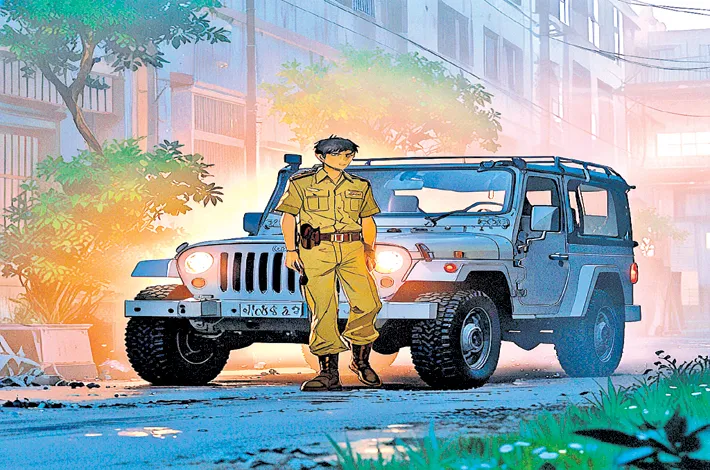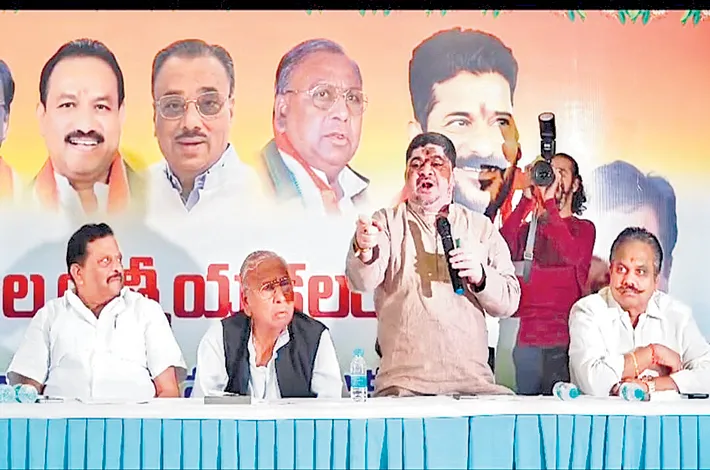The Mist of Vengeance
09-07-2025 12:00:00 AM

The mist hung low over the crumbling haveli, its tendrils curling around the ancient banyan tree like ghostly fingers. In the heart of rural Bengal, where the Ganges whispered secrets to the night, the village of Chandanpur lay gripped by an uneasy silence. The year was 1972, and the old manor, once a symbol of opulence, now stood as a monument to decay. It was here that Arjun Roy, a brooding police inspector with a haunted past, arrived to unravel a mystery that would shake the village to its core.
Arjun stepped out of his jeep, his boots crunching on the gravel path leading to the haveli. The air was thick with the scent of damp earth and jasmine, but something darker lingered—an undercurrent of dread. He had been summoned by a frantic telegram from the local thana: Anjali Sen, bride of industrialist Vikram Sen, found dead. Suspected murder. The case reeked of scandal, and Arjun, fresh from a botched investigation in Kolkata that had cost him his reputation, was determined to redeem himself.
The haveli’s caretaker, an old man named Bimal with eyes like polished obsidian, greeted Arjun at the gate. “She was a kind soul, saab,” he muttered, his voice trembling. “But this house… it swallows the living.” Arjun brushed off the superstition, though the weight of Bimal’s words clung to him like the mist.
Inside, the haveli was a labyrinth of shadows. Cobwebs draped the chandeliers, and portraits of long-dead aristocrats stared down with accusing eyes. Vikram Sen, the widower, awaited Arjun in the drawing room. He was a man in his late forties, impeccably dressed but with a face carved by grief—or guilt. “I loved her,” Vikram said, his voice steady but his hands betraying a nervous tremor. “We were married only a year. Who would do this to her?”
Anjali’s body had been found at dawn, sprawled at the foot of the grand staircase, her neck bruised and her silk saree torn. The local doctor ruled it a strangulation, but the absence of fingerprints or signs of a struggle puzzled Arjun. The household staff, a tight-lipped group of five, claimed to have heard nothing. Yet, their furtive glances told a different story.
Arjun’s investigation began with the staff. There was Lakshmi, the cook, whose sharp tongue masked a deep loyalty to the family; Mohan, the driver, whose alcoholism was an open secret; and Shanti, the young maid, who seemed terrified to speak. Then there was Ravi, Vikram’s personal secretary, a wiry man with a habit of avoiding eye contact. Lastly, Bimal, whose cryptic warnings about the haveli’s curse grated on Arjun’s nerves.
As Arjun questioned them, he uncovered fragments of Anjali’s life. She had been a city girl, vibrant and modern, but trapped in a marriage that seemed more like a gilded cage. Whispers of Vikram’s temper and Anjali’s loneliness surfaced, but no one dared speak openly. Arjun’s instincts told him the truth lay in the haveli itself, in its secrets and shadows.
That night, as the mist thickened outside, Arjun explored the upper floors. The creak of floorboards echoed like whispers, and a faint scent of jasmine—Anjali’s favorite perfume—lingered in the air. In her bedroom, he found a locked diary hidden beneath a loose floorboard. The key was missing, but the discovery confirmed his suspicion: Anjali had been hiding something.
The next day, Arjun confronted Vikram about the diary. The industrialist’s composure cracked, his eyes flashing with anger. “You’re wasting time, Inspector. My wife’s killer is out there, not in some diary!” But Arjun wasn’t convinced. He tasked a local locksmith with opening the diary and turned his attention to Ravi, the secretary, whose nervous demeanor had grown more pronounced.
Under pressure, Ravi revealed a bombshell: Anjali had been planning to leave Vikram. She had confided in him about an affair with a man from Kolkata, someone she’d met before her marriage. “She was desperate,” Ravi whispered. “She said Vikram would never let her go.” The revelation painted Vikram as a prime suspect, but Arjun needed more than motive.
The diary, once unlocked, was a goldmine. Anjali’s elegant handwriting detailed her fear of Vikram’s controlling nature and her love for a man named Sameer, a painter she’d met during a trip to the city. The final entry, dated the night of her death, read: He knows. I’m not safe. Arjun’s pulse quickened. Had Vikram discovered the affair and killed her in a fit of rage?
But the case took a twist when Shanti, the maid, broke her silence. Trembling, she confessed to seeing Mohan, the driver, near the staircase that night, reeking of liquor and muttering about “teaching her a lesson.” Arjun interrogated Mohan, who admitted to arguing with Anjali about unpaid wages but swore he hadn’t touched her. His alibi was weak, and Arjun detained him.
Yet, something didn’t add up. The bruises on Anjali’s neck suggested a calculated act, not a drunken brawl. Arjun returned to the haveli, driven by a hunch. In the attic, he found a hidden compartment containing a locket with a photo of Anjali and Sameer. The locket was inscribed with a date—two weeks before her death. Sameer had been in Chandanpur.
Tracking Sameer to a rundown lodge on the village outskirts, Arjun found the painter in a state of despair. “I loved her,” Sameer sobbed. “But she wouldn’t leave him. She said he’d kill her first.” Sameer admitted to visiting the haveli that night, begging Anjali to run away with him. When she refused, he left in anguish. His story checked out—witnesses at the lodge confirmed his return before midnight.
The mist was closing in, both literally and figuratively. Arjun’s investigation circled back to Vikram. Confronting him, Arjun laid out the evidence: the diary, the affair, the locket. Vikram’s facade crumbled. “She betrayed me,” he spat. “But I didn’t kill her. I loved her too much.” His words rang hollow, and Arjun arrested him.
The truth, however, emerged in a chilling confession from an unexpected source. Lakshmi, the cook, broke down during a final round of questioning. She had overheard Anjali’s plan to leave and, fiercely loyal to Vikram, confronted her mistress. In a moment of rage, Lakshmi had pushed Anjali, who fell against the staircase railing, snapping her neck. Panicked, Lakshmi staged the scene to look like a strangulation.
As Arjun led Lakshmi away in handcuffs, the mist seemed to lift, but the haveli’s shadows remained. The case was solved, but the scars it left—on Arjun, on the village, on the cursed house—would linger. Driving away from Chandanpur, Arjun glanced back at the haveli, its silhouette fading into the fog. Some mysteries, he knew, would never fully unravel.








